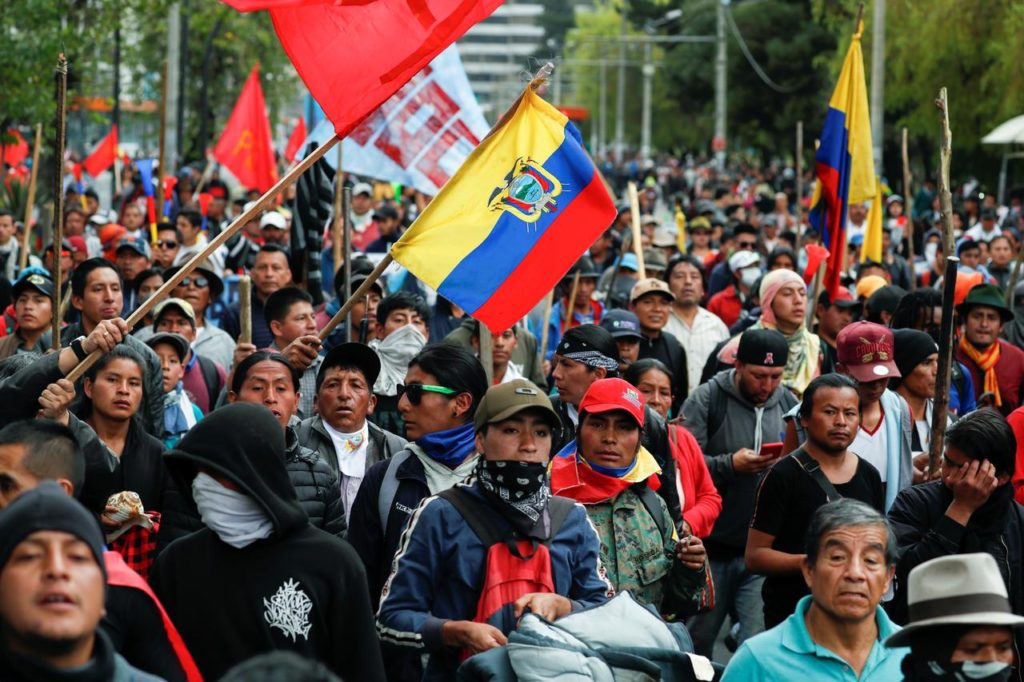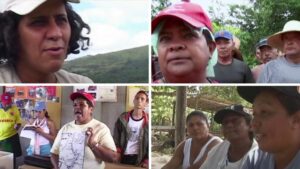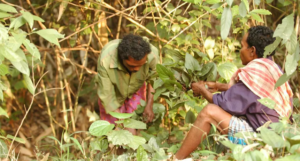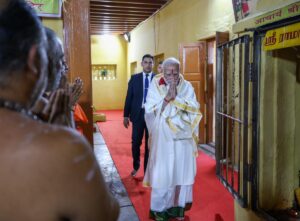Ecuador’s National Assembly dismissed government minister María Paula Romo from her position on November 24, over her actions during last year’s anti-government protests. Romo allowed the use of expired tear gas canisters against protesters and authorised the police violence inside the humanitarian aid centres set up at universities where activists were staying. Data from the Ecuadorian Ombudsman’s Office revealed that police had used excessive force at the protests. At least 11 people were killed, 1340 injured and more than 1000 were detained.
Romo’s impeachment followed demonstrations organised by the Federation of University Students of Ecuador (FEUE) outside the National Assembly. This is an important victory for the Ecuadorian people and deals a blow to President Lenin Moreno’s vision of neoliberal authoritarianism.
Moreno took office in 2017, riding on the back of former leftist President Rafael Correa’s support. Having served as vice president (2007-13) in Correa’s government, he was expected to continue the progressive agenda of a strong welfare state. Instead, Moreno chose to comprehensively break away from the previous paradigm of anti-neoliberalism, persecuting Correa and his supporters.
Correa’s socialist policies
Correa won the 2007 presidential election after defeating Álvaro Noboa Pontón, a banana tycoon and one of the richest men in the country.
In a referendum called by Correa, the population voted to draft a new constitution. A Constituent Assembly was formed through general elections, with only a few members representing economic elites or their parties.
The new Constitution, adopted by referendum in 2008, weakened the economic clout of the capitalist class and tried to de-corporatise the state.
Article 312, for instance, prohibits banks, bankers and all owners of bank assets from simultaneously holding assets in mass media. The government thereby forced the country’s main conglomerate, Banco Pichincha, to sell its stocks in the television channel Teleamazonas.
Economic elites were troubled by the pro-people ideology of Correa’s Citizens’ Revolution Movement (CRM), which disallowed them from freely accumulating wealth and impoverishing the majority. Several representatives of big businesses complained that the government was using fiscal reforms and tax reviews to regulate their activities. They reported undergoing numerous tax audits for the previous year, which threatened their companies with penalties and retroactive payments.
Through tax reforms, Correa’s government forced a more thorough disclosure of information about company ownership, to properly assess and control the economy. Since 2007, the Internal Revenue Service has published a yearly compilation of all economic groups identified through investigations of tax reports and data from state agencies.
In opposition to imperialist globalisation, Correa’s government initially withdrew from trade negotiations with the European Union and imposed a tax on currency outflows to limit capital flight. It imposed tariffs to control international trade, promote a selective substitution of imports and restrict the trade imbalance resulting from the overconsumption of imported products.
Correa’s coming to power consolidated the capacity of the state to implement agricultural and other programs. New investments were channeled through the Ministry of Agriculture, Livestock, Aquaculture and Fisheries (MAGAP) and the Institute for the Popular and Solidarity Economy.
In the first years of the government, different programs were implemented including a subsidised nitrogen fertiliser program. MAGAP raised investments in extension services through a new program, Schools of the Agrarian Revolution (ERAs), aimed at smallholders. The ERAs evolved into the program “Shoulder to Shoulder”, allowing agronomists to have an office in rural communities. The government also invested heavily in the High Yield Seed Program, which provided producers owning less than 20 hectares of land with subsidised kits of improved seed varieties, fertilisers and pesticides.
The wide-ranging transformation occurring under Correa’s administration was a part of the CRM process of social rejuvenation comprising: the approval of a constitution that enriched the conception of rights and laid out democratic guarantees; an audit of the external public debt; a reaffirmation of new labour rights; an effort to build up publicly-owned business in the provision of social services and in strategic areas of the economy; an expansion of social spending; and a rise in taxes on the highest incomes.
According to René Ramírez Gallegos, who was Ecuador’s secretary of higher education, science, technology and innovation during the period 2011–17, there are five components of the social model instituted by Correa: “The first is the change from anthropocentrism to biocentrism. The second change is to move from a capitalist economy to a social and solidarity economy. The third is to move from patriarchy to feminism. The fourth is to move from colonialism to a plurinational and intercultural state and society. And the last is to move from a purely representative democracy to a participatory and deliberative democracy.”
Neoliberalism redux
Moreno has done away with any pretences of being socialist—trying to re-institute neoliberalism through state repression.
To re-establish relationships with the capitalist class, he summoned an Advisory Council on Production and Taxes, whose leading committee was composed of seven state officials and six representatives of the private sector designated by the president. The council organised a gathering of about 1600 businesspeople where Richard Martínez, a businessperson with a large public profile, presented the business sectors’ plans to the government.
In May 2018, Martínez was appointed as the new minister of economy and finance, representing the culmination of the state’s re-subordination to neoliberalism. By inviting Martínez to join the government, Moreno integrated one of the main leaders and unifiers of the business class into his cabinet.
The new administration also reoriented its foreign policy and jumped on the bandwagon of neo-imperialist globalisation. Moreno has taken Ecuador out of the Union of South American Nations and the Bolivarian Alliance of the Peoples of Our America—regional groupings that advocate a broadly progressive agenda of social reconstruction.
Moreno then joined the Lima Group—set up in Peru in 2017 to overthrow Venezuela’s Bolivarian government—with a view to participating in the Pacific Alliance.
The imperialist subjugation of Ecuador has naturally resulted in major internal crises of legitimacy.
Vice-president Otto Sonnenholzner announced economic measures in September last year, which he said would be difficult for many and had to be accepted as a “major sacrifice”. These brought about a new onslaught of economic “reforms” sponsored by the International Monetary Fund (IMF)—a neocolonial institution Moreno’s government happily embraced.
Moreno signed a framework agreement with the IMF last year. This signaled the arrival of full-throated neoliberalism: an increase in fuel costs; greater ease in hiring and firing; the removal of restrictions on capital flows; privatisation; reduction of public sector workers’ holidays by half; and an end to the financing of the state budget by the Central Bank.
The government announced it would remove long-standing fuel subsidies and introduce other measures aimed at increasing the precarity of workers in October last year. The cost of a gallon of petrol would rise from US$1.85 to $2.39 (29% rise) and a gallon of diesel was set to rise from US$1.03 to $2.30 (123% rise).
The National Unitary Collective of Workers, the Confederation of Indigenous Nationalities of Ecuador (CONAIE), the United Workers’ Front (FUT) and other social organisations announced, on October 2, 2019, mobilisations throughout the country against these measures.
CONAIE president Jaime Vargas called on “18 peoples, 14 indigenous nationalities and social organisations from all over the country to the great national mobilisation in favour of a dignified life for Ecuadorians.” By the next day, the country was paralysed by road blocks, large local demonstrations and takeovers of municipal buildings.
In the heat of the October 2019 uprising, CONAIE declared: “With the unity of the people in active resistance, we will not allow the imposition of the economic policies of the IMF, nor privatisation, nor labour flexibility and deregulation, nor any economic measure that affects and impoverishes the Ecuadorian people. All together to face the neoliberal package: we call peasants, workers, citizens, exploited from the countryside and the city, to join forces in forceful actions and confront in unity the treacherous government of Lenin Moreno.”
Socialist potential
Ecuador is currently in a period characterised by immense class tensions—the ruling class’ brutal project of neoliberalism is making life unbearable for the people.
Poverty and extreme poverty afflicted 21.5% and 7.9% of the population, respectively, in 2017. In just two years, both figures rose to 25% and 8.9%.
The existential degradation unleashed by Moreno has significantly increased the electoral appeal of the leftist presidential candidate Andrés Arauz—an economist and former minister in Correa’s government who will lead the ticket for the Union for Hope coalition in next year’s election.
As Ecuador continues to go down the rabbit hole of neoliberalism, the possibility of a new socialist future will keep rising.
(Article courtesy: Green Left, an Australian socialist publication.)
❈ ❈ ❈
Editorial addition: And now for the good news. Peoples Dispatch reports:
Ecuador’s Electoral Council Approves Candidacy of Andrés Arauz for Upcoming General Elections
Ecuador’s National Electoral Council (CNE), on December 8, approved the presidential ticket, with Andrés Arauz and Carlos Rabascall, of the progressive Union for Hope (UNES) alliance for the 2021 general elections.
The president of the CNE, Diana Atamaint, reported that the CNE had received a certification on the qualification of the UNES presidential ticket by the Electoral Dispute Tribunal (TCE) and that the duo was enabled to compete in the elections.
The TCE’s certification implies that there are no pending appeals against the candidates of the UNES alliance and that the court has resolved to dismiss and disqualify all the pending complaints filed against the alliance by right-wing parties to prevent the participation of its candidates. In total, five different appeals were presented to challenge the candidacy of Arauz and Rabascall, who according to various opinion polls are leading the voting intention.
Through a tweet, Arauz thanked the people for their support in the face of political persecution. “#ThePresidentialTicketOfHope will be on the ballot on #7thFebruary. Thanks to everyone who was vigilant and mobilized! Thanks for international solidarity! The Ecuadorian people have enforced their right to choose in democracy,” wrote Arauz.
The UNES is a coalition of left-wing political parties such as Fuerza Compromiso Social or Social Commitment Force, Centro Democrático or Democratic Center as well as hundreds of social organizations, trade unions, student, teacher, Indigenous, peasant, women and LGBTQI movements, among others. It is led by former President Rafael Correa.
The UNES registered former economic minister Andrés Arauz and journalist Carlos Rabascall as candidates for presidency and vice-presidency, respectively, on October 2, after fighting their possible disqualification in the streets.
Rabascall replaced Correa as the new vice-presidential candidate on September 16, after Correa was definitely disqualified from contesting in the elections as a result of the lawfare waged against him by the current president Lenín Moreno.
Former president Correa also commented on the CNE’s decision and said that “it is the beginning of the end of the nightmare.” He added that he is “not claiming victory”, but stressed that the opposition “could not eliminate us.” Likewise, Correa denounced that “now they will try to delay the elections” and “force a second round.”
Last week, Aráuz also denounced that Moreno’s government was seeking to postpone the elections so that the elite groups allied to his administration could complete their privatization program for various public companies.
In September, Moreno’s administration began privatizing the state-owned oil company, Esmeraldas Refinery and the electricity company, Electricity Corporation of Ecuador (CELEC), among others, which were recovered and strengthened during Correa’s government (2007-2017).
The general elections in Ecuador are scheduled for February 7, 2021. There are 16 presidential candidates contesting in the elections. According to the electoral calendar, the campaign will take place between December 31 and February 4.
In order to win in the first round, a candidate needs to secure more than 50% of the votes or more than 40% of the votes with a 10% lead over the runner-up. In case, if no candidate wins a simple majority, the run-off will be held on April 11.




